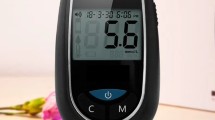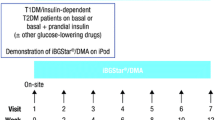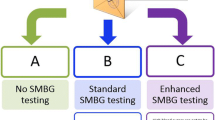Abstract
Self-monitoring of blood glucose (SMBG) has been recommended for people with type 2 diabetes mellitus. This trial tested an automated self-management monitor (ASMM) that reminds patients to perform SMBG, provides feedback on results of SMBG, and action tips for improved self-management. This delayed-start trial randomized participants to using the ASMM immediately (IG), or following a delay of 6 months (DG). Glycated hemoglobin (HgbA1c) level and survey data was collected at home visits every 3 months. 44 diabetic men and women, mean age 70, completed the 12-month trial. Baseline HgbA1c was 8.1 % ± 1.0, dropping to 7.3 ± 1.0 by 9 months, with a 3-month lag in the DG (F = 3.56, p = 0.004). Decrease in HgbA1c was significantly correlated to increased frequency of SMBG, R = 0.588, p < 0.01. Providing older diabetics with objective immediate contingent feedback resulted in more frequent SMBG that correlated with better glycemic control. This type of technology may provide real-time feedback not only to patient users, but to the health care system, allowing better integration of provider recommendations with patient-centered action.


Similar content being viewed by others
References
Bandura, A. (1977). Self-efficacy: Toward a unifying theory of behavioral change. Psychological Review, 84, 191–215.
Centers of Disease Control and Prevention. (2001). Strategies for reducing morbidity and mortality from diabetes through health-care system interventions and diabetes self-management education in community settings. A report on recommendations of the Task Force on Community Preventive Services. MMWR. Recommendations and Reports: Morbidity and Mortality Weekly Report. Recommendations and Reports/Centers for Disease Control, 50, 1–15.
Cox, D. J., Irvine, A., Gonder-Frederick, L., Nowacek, G., & Butterfield, J. (1987). Fear of hypoglycemia: quantification, validation, and utilization. Diabetes Care, 10, 617–621. doi:10.2337/diacare.10.5.617
Farmer, A., Wade, A., Goyder, E., Yudkin, P., French, D., Craven, A., et al. (2007). Impact of self monitoring of blood glucose in the management of patients with non-insulin treated diabetes: Open parallel group randomised trial. BMJ, 335, 132. doi:10.1136/bmj.39247.447431.BE
Guerci, B., Drouin, P., Grangé, V., Bougnères, P., Fontaine, P., Kerlan, V., et al. (2003). Self-monitoring of blood glucose significantly improves metabolic control in patients with type 2 diabetes mellitus: The Auto-Surveillance Intervention Active (ASIA) study. Diabetes & Metabolism, 29, 587–594.
Harris, M. I., Flegal, K. M., Cowie, C. C., Eberhardt, M. S., Goldstein, D. E., Little, R. R., et al. (1998). Prevalence of diabetes, impaired fasting glucose, and impaired glucose tolerance in U.S. adults: The Third National Health and Nutrition Examination Survey, 1988–1994. Diabetes Care, 21, 518–524. doi:10.2337/diacare.21.4.518
Irwin, M., Artin, K. H., & Oxman, M. N. (1999). Screening for depression in the older adult: Criterion validity of the 10-item Center for Epidemiological Studies Depression Scale (CES-D). Archives of Internal Medicine, 159, 1701–1704.
Keele, G. (2007). The value of blood glucose self monitoring in type 2 diabetes is limited. BMJ, 335, 105. doi:10.1136/bmj.39276.549109.47
King, A. C., Friedman, R., Marcus, B., Castro, C., Napolitano, M., Ahn, D., & Baker, L. (2007). Ongoing physical activity advice by humans versus computers: The Community Health Advice by Telephone (CHAT) trial. Health Psychology: Official Journal of the Division of Health Psychology, American Psychological Association, 26, 718–727. doi:10.1037/0278-6133.26.6.718
Kleefstra, N., Ubink-Veltmaat, L. J., Houweling, S. T., Groenier, K. H., Meyboom-de Jong, B., & Bilo, H. J. G. (2005). Cross-sectional relationship between glycaemic control, hyperglycaemic symptoms and quality of life in type 2 diabetes (ZODIAC-2). The Netherlands Journal of Medicine, 63, 215–221.
Kroenke, K., Spitzer, R. L., & Williams, J. B. (2001). The PHQ-9: Validity of a brief depression severity measure. Journal of General Internal Medicine, 16, 606–613.
Kwon, H. S., Cho, J. H., Kim, H. S., Song, B. R., Ko, S. H., Lee, J. M., et al. (2004). Establishment of blood glucose monitoring system using the internet. Diabetes Care, 27, 478–483.
Leventhal, H., Brissette, I., & Leventhal, E. (2003). The common sense models of self-regulation of health and illness. In L. Cameron & H. Leventhal (Eds.), The self-regulation of health and illness behavior (pp. 42–61). London: Routledge Taylor and Francis Group.
Mann, D. M., Ponieman, D., Leventhal, H., & Halm, E. A. (2009). Misconceptions about diabetes and its management among low-income minorities with diabetes. Diabetes Care, 32, 591. doi:10.2337/dc08-1837
McAndrew, L., Schneider, S. H., Burns, E., & Leventhal, H. (2007). Does patient blood glucose monitoring improve diabetes control? A systematic review of the literature. The Diabetes Educator, 33, 991–1013. doi:10.1177/0145721707309807
Miltenberger, R. G. (2012). Behavior modification: Principles and procedures (5th ed.). Belmont, CA: Wadsworth Cengage Learning.
O’Kane, M. J., Bunting, B., Copeland, M., & Coates, V. E. (2008). Efficacy of self monitoring of blood glucose in patients with newly diagnosed type 2 diabetes (ESMON study): Randomised controlled trial. BMJ, 336, 1174–1177. doi:10.1136/bmj.39534.571644.BE
Rutten, G., van Eijk, J., de Nobel, E., Beek, M., & van der Velden, H. (1990). Feasibility and effects of a diabetes type II protocol with blood glucose self-monitoring in general practice. Family Practice, 7, 273–278.
Talbot, F., Nouwen, A., Gingras, J., Gosselin, M., & Audet, J. (1997). The assessment of diabetes-related cognitive and social factors: The Multidimensional Diabetes Questionnaire. Journal of Behavioral Medicine, 20, 291–312.
The Diabetes Control and Complications Trial Research Group. (1993). The effect of intensive treatment of diabetes on the development and progression of long-term complications in insulin-dependent diabetes mellitus. The New England Journal of Medicine, 329, 977–986. doi:10.1056/NEJM199309303291401
Tschanz, J. T., Welsh-Bohmer, K. A., Plassman, B. L., Norton, M. C., Wyse, B. W., Breitner, J. C. S., & Cache County Study Group. (2002). An adaptation of the modified mini-mental state examination: Analysis of demographic influences and normative data: The cache county study. Neuropsychiatry, Neuropsychology, and Behavioral Neurology, 15, 28–38.
UK Prospective Diabetes Study (UKPDS) Group. (1998). Intensive blood-glucose control with sulphonylureas or insulin compared with conventional treatment and risk of complications in patients with type 2 diabetes (UKPDS 33). Lancet, 352, 837–853.
Welschen, L. M. C., Bloemendal, E., Nijpels, G., Dekker, J. M., Heine, R. J., Stalman, W. A. B., & Bouter, L. M. (2005). Self-monitoring of blood glucose in patients with type 2 diabetes mellitus who are not using insulin. The Cochrane Database of Systematic Reviews,. doi:10.1002/14651858.CD005060.pub2
Acknowledgments
This article presents independent research commissioned by the National Institute of Health (NIH) and Agency for Healthcare Research and Quality (AHRQ). The views expressed in this publication are those of the author(s) and not necessarily those of the NIH or AHRQ. We thank all the research participants for their time and interest in the study.
Funding
This study was supported by NIA Grants R44 AG019528-02 and AHRQ R18 HS17276-01. Abbott Laboratories provided glucometers for study participants.
Disclosures
The author(s) report no financial or other relationship relevant to the subject of this article.
Author information
Authors and Affiliations
Corresponding author
Ethics declarations
Conflict of interest
Jason C. Levine, Edith Burns, Jeffrey Whittle, Raymond Fleming, Paul Knudson, Steve Flax and Howard Leventhal declare that they have no conflict of interest.
Human and animal rights and Informed consent
All procedures followed were in accordance with ethical standards of the responsible committee on human experimentation (institutional and national) and with the Helsinki Declaration of 1975, as revised in 2000. Informed consent was obtained from all patients for being included in the study.
Rights and permissions
About this article
Cite this article
Levine, J.C., Burns, E., Whittle, J. et al. Randomized trial of technology-assisted self-monitoring of blood glucose by low-income seniors: improved glycemic control in type 2 diabetes mellitus. J Behav Med 39, 1001–1008 (2016). https://doi.org/10.1007/s10865-016-9763-5
Received:
Accepted:
Published:
Issue Date:
DOI: https://doi.org/10.1007/s10865-016-9763-5




